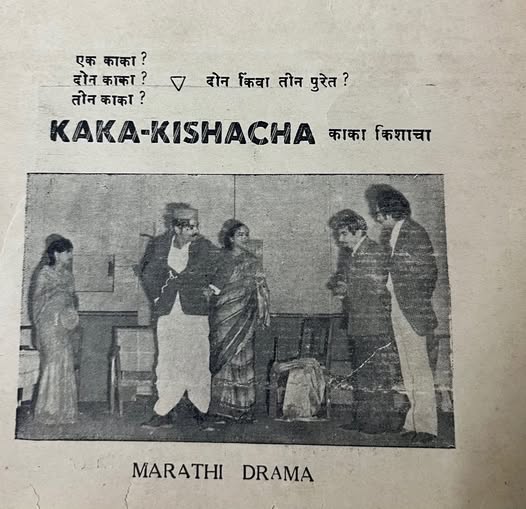Yesterday evening, in the quiet of the MGIMS library, I found Sushruta—the student magazine from 1974. Its cover was worn. The pages were yellow, some torn at the edges, faded with age. They carried the smell of time. As I turned them, I reached the Marathi section edited by Dr. Narayan Daware (class of 1971), whom we sadly lost in Nagpur in 2018.
Inside, I came across his note on a play staged during the annual sneh sammelan. His Marathi words were so full of warmth that I felt like bringing them into English.

Reading them, I slipped back into the winter of 1974. Sevagram was then a quiet village. The nights were still, broken only by the whistle of the GT Express.
But on the sixth of February, the campus was alive. Students ran about, lanterns glowed near the rangmanch, and the air was full of thrill. That night, काका किशाचा—Shyam Dake’s hilarious play made famous by Kishore Pradhan—was about to begin.
When the curtain opened, Subhash Patil (now Manohar Chaudhary), Sudhir Deshmukh, Alhad Pimputkar, Shyam Babhulkar, Meena Kurundwadkar, Vrunda Khandare, Narayan Daware, and Shirish Gode left behind their white aprons and became someone else. They came from the first four MGIMS batches (1969–72). For a month they had practised for hours every day. By the time the play began, the stage felt like their home.
Their voices rose and fell. Their silences spoke too. The audience leaned forward, forgetting they were in a medical college hall.
And then came the wonder—shadow play. With nothing but light, cloth, and imagination, Rajeev S Chaudhari, Yadunath Telkikar, and Sheelmohan Sachdev brought to life the shapes of Bajiprabhu Deshpande, Vasantrao Deshpande, and P. L. Deshpande. The figures moved across the screen, and the hall gasped. Sevagram had never seen such magic.
When the final act ended, a hush lingered before applause burst like summer rain. The audience rose to give a standing ovation. Dr. M. D. Khapre ( Pharmacology) and Dr. B. V. Deshkar (Physiology) , who had worked side by side with the students to bring the stage alive, sat beaming with pride. And so was Sudhakar Deshpande, the drama director from Nagpur who was with the students for almost a month. To see their students perform with such heart, and to hear the audience clap so long and loud, was a reward in itself.
Those who once stood on that Sevagram stage are now in their seventies. Fifty years have gone by. But their laughter, their lines, and that glowing night still live on in memory.
And I wonder—somewhere on this campus, is another such evening waiting to be born?